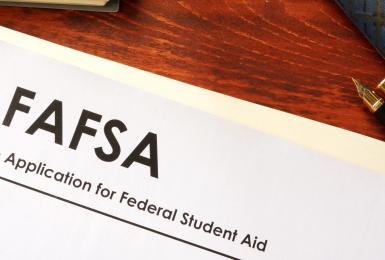Whether you're just a few credits away from finishing your degree or have a ways to go, paying to finish school is a heavy burden for many adult learners. The good news? There are all kinds of scholarships for adults returning to college that can help ease the financial strain of finishing your degree.
Of course, the challenge is finding the right scholarships for you. Fortunately, we've got some useful resources that can help you find scholarships for returning students and other forms of financial aid to make paying for school a little easier. Keep reading to find out how to find scholarships and other financial aid resources as a returning student.
The Importance of Continuing Education for Adults
No matter how many college credits you have (or don't have) under your belt, completing your degree can pay off in several ways.
Career Advancement
The right degree could help you advance in your current career, allowing you to gain the skills and formal education experience needed to move up the proverbial career ladder. Higher education could pave the way for promotions, raises, and even leadership positions for which you need a degree to be eligible.
Expanding Job Opportunities
Getting a degree or certificate from a reputable school could help ease the transition if you want to make a career change. By finishing your degree, you can achieve the credentials you need to enter an entirely new industry and explore a wider range of job opportunities.
How Scholarships Can Help Ease the Financial Strain for Adults
Scholarships are an ideal financial aid option for adult students because this money does not need to be paid back. Unlike loans, which accumulate interest and need to be paid back after you finish school, scholarship money can significantly offset the cost of school. Plus, there is no limit to the amount of scholarship money you can qualify for during any given period; some adult learners may even be eligible for enough scholarships to cover all their schooling costs.
Even if your scholarships cover just a portion of your college costs, this is money that you won't have to borrow or pay out of pocket.
Where to Find Unique Scholarships for Adult Students
As you begin exploring scholarship opportunities, you'll notice that many scholarships are most readily available to students enrolling directly from high school. Adult learners may be finishing up a degree from another institution or attempting to return to college after a hiatus, making them ineligible for some scholarship opportunities. The abundance of scholarships aimed at high schoolers can make it challenging for adult learners to find scholarships they qualify for. The reality is that there are scholarships for adults returning to college, though it may take some time and effort to find them.
One of the best resources to find scholarships for adults is Career One Stop, where you can use a scholarship finder tool to narrow down specific opportunities that apply to you. There, you can find a wide range of less traditional scholarships.
Scholarships for Non-Traditional Students
While there are many definitions of the term "non-traditional student," this essentially refers to any college student not conventionally enrolling in school. For example, a non-traditional student could be an adult returning to learn after several years away from it or even an adult student with dependents. Regardless, there are plenty of scholarships available specifically to non-traditional students.
Scholarships for Students With Diverse Backgrounds or Experiences
It is also typical to see scholarships offered to students with diverse backgrounds or life experiences. These types of scholarships may be intended for students who have lived in other countries, speak different languages, or are from a different culture. Colleges, universities, and even private institutions may offer special scholarships for these students.
Scholarships for Older Adults or Retirees Returning to School
While not as common, older adults and those already retired may choose to return to school and complete a bachelor's degree or other college degree program. If this applies to you, you may want to consider exploring scholarship opportunities specifically for older adults or retirees.
Scholarships for Specific Fields of Study or Career Paths
You may also want to look for scholarships specifically offered to students in your desired field of study. If you want to go into business, you may find private, third-party scholarships available to help cover business school costs.
Scholarships for Individuals Facing Financial Challenges
If you're from a less conventional socioeconomic background or otherwise face financial challenges when paying for school, consider exploring needs-based scholarships that will look specifically at your financial needs.
Exploring Other Financial Aid Options for Adult Learners
In addition to scholarships for adults returning to college, there are other financial aid options that you may want to consider as you prepare to finish your degree—these range from grants to subsidized and unsubsidized student loans.
Eligibility Criteria for Federal Financial Aid Programs
If you hope to receive federal financial aid as part of your return to school, you'll need to fill out and submit a Free Application for Federal Student Aid (FAFSA). From there, the government will consider a wide range of eligibility criteria, and you will automatically be notified of any financial aid you qualify for.
Eligibility criteria that are considered for federal financial aid programs include:
- Your citizenship status
- Your enrollment status
- The school in which you are attending
- Your financial need
Types of Federal Aid Available for Adult Learners
Many different types of federal financial aid may be available to adult learners, ranging from federal grants (which do not need to be paid back) to federal student loans (which do need to be paid back with interest). Some specific examples of federal grants and loans that you may be considered for with your FAFSA include:
- Discretionary grants
- Formula grants
- Student grants
- Subsidized loans
- Unsubsidized loans
Reducing Your Educational Expenses
In addition to the federal financial aid and private scholarships available, there are further measures adult learners can take to reduce their educational expenses. Here are some supplemental considerations for minimizing the cost of higher education:
Employer Tuition Assistance
If you're currently employed part-time or full-time, check with your human resources team to find out whether your employer offers any tuition assistance or reimbursement program. If so, you may be eligible to have some or all of your education paid for by your employer. Typically, this works through reimbursement, where you'll submit proof of your passing grades to your employer at the end of each semester and receive direct reimbursement for some or all of your education costs.
Not all employers offer tuition assistance, but it is always worth checking to see if this benefit is available.
Online College
Another option for reducing college expenses is enrolling in an online degree or certificate program rather than attending classes on a physical campus. Online programs tend to cost less per credit hour than in-person programs, but you'll also save yourself the cost of commuting to campus or relocating to a college campus. These savings can add up significantly to make your return to school much more affordable.
CLEP Tests
Depending on your experience and knowledge in certain subjects, you may be able to test out of some of your college classes by taking a College-Level Examination Program (CLEP) exam. These exams typically cost less than $100 and can save you hundreds or even thousands of dollars on your college classes. While not offered for every type of college class, these exams are typically available to help adult learners test out of some general education courses.
Consider Part-Time Enrollment
If enrolling in college full-time is proving to be too expensive, one option many adult learners pursue is attending school part-time instead. This way, you can minimize the costs of tuition and related expenses while still working towards your degree. Meanwhile, enrolling part-time can mean you can continue working part-time or full-time while in school.
Financial Aid Consulting
If your school has a financial aid counseling center or similar resources, take advantage. Setting up an in-person or virtual meeting with an experienced financial aid advisor can be a great way to learn more about your options for paying your way through school. You might even learn about options you didn't know were available, such as payment plans and work-study opportunities.
Military Aid
If you've served in the Armed Forces, you may also be eligible for reimbursement or funding for college. A wide range of grants and scholarships are available to those who have served in the military, so be sure to explore your options and take advantage.
Achieve Your Educational Goals With Champlain College Online
Don't let the burden of paying for school keep you from working towards your goals. Even as an adult returning to school, there are plenty of ways to help lessen the financial impact and qualify for financial aid.
At Champlain College Online, we believe that cost should never be a barrier to the higher education you deserve. That's why we offer a wide range of financial aid options and other resources— including our truED program, which offers career-focused learning at a reduced cost.
Learn more about programs offered through Champlain College Online by getting in touch or starting your application today.
Frequently Asked Questions
What Is the Best Strategy for Applying for Scholarships for Adults?
The best strategy is to use a scholarship locator (such as the one found here) to narrow down scholarship opportunities based on your unique eligibility criteria. Likewise, submitting a FAFSA is a great way to be considered for financial aid options (including grants and scholarships) directly from the federal government with just one application.
Is There an Age Limit on Scholarships?
Most scholarships don't have specific age limits, although some private scholarship funds might. However, some scholarships, such as those offered to retired adults, may be restricted based on age.
How Do Adults Pay for College?
There are many viable ways for adults to pay for college, ranging from financial aid through grants and scholarships to student loans. Likewise, some adult students with jobs may choose to pay for some of their education out of their own pockets, which can help offset the amount that needs to be borrowed. Some schools even offer payment plans specifically for this purpose, allowing students to break up their tuition payments for each semester over a few installments.
What Are Some Other Resources for Adult Students?
Adult students should always turn to the financial aid offices at their respective schools. The counselors at these offices can often provide helpful and specific guidance on scholarship opportunities and other options to make paying for school a little easier. Adult students are also encouraged to check with their employees to see if tuition assistance programs may be available.
Can an Adult Get FAFSA?
Yes, adults can (and should) fill out a FAFSA by the submission deadline posted by their chosen school. Filling out this application will ensure that you are considered for any federal student aid options for which you may qualify. Federal aid includes federal grants and even subsidized student loans.
How Many Scholarships Can You Get?
There is no limit to the number of scholarships you can receive as an adult returning to school. Some students may qualify for enough scholarships that the entire cost of their schooling is paid for. Even receiving a few scholarships each semester can help you save hundreds or even thousands of dollars on your education costs.
Contact Admissions
Discuss options for funding your online education with an admissions coach. We can help you find the resources you need.

Contact Admissions
I acknowledge that, by clicking the "submit" button, I am giving my express written consent to Champlain College and its representatives to contact me about educational opportunities via email, text, or phone, at the phone number above, including my mobile phone, using an automatic dialer, or pre-recorded message. Message and data rates may apply. I understand that my consent is not a requirement for enrollment, and I may withdraw my consent at any time.






